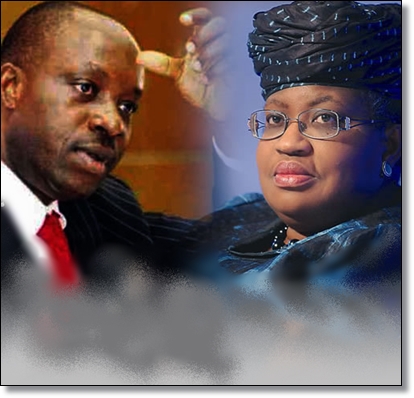Okonjo-Iweala Vs Charles Soludo: A Case of Pot and Kettle?

 |
This is a case of kettle calling a cooking pot over charcoal stove black or vice versa. Since 1999, when President Obasanjo, recruited Mrs. Ngozi Okonjo-Iweala, Charles Soludo, Magnus Kpakol; Charles and Magnus serving as Economic Advisers at some point, and with Madam Okonjo-Iweala being promoted as a 'messiah' of some sort, Nigeria economic wellbeing has suffered and keep tanking.
The suffering of Nigerians and the attendant devaluation of the Naira are very evident. President Jonathan, mesmerized and intimidated by those in his administration who hold a PhD, and lacking the fortitude to be critical of certain happenings under his watch, has allowed malfeasance in the economy to go unchallenged. No genius is needed to see the deplorable condition of Nigeria’s economy since the advent of the new political dispensation - 1999.
Any nation that loses the principal value of its savings cannot be said or seen to be doing well. In 1999, One Million Naira had an equivalent value of $11,000. Today, One Million Naira is mere $4,500. Computing the value loss indicates more than 200%. Assuming one had put aside One Million Naira in 1999 in a Fixed Deposit earning or attracting annual saving interest rate of 5%, in 16 years hence, the resulting value is less than what the principal savings amount was.
Here is the math: In 16yrs, the resulting amount is N1, 936,000 – compounding interest rate, accounting for inflation and various adjusted inter-bank rates by CBN during this period. When N1, 936,000 is converted at current buy-back rate N205 to the Dollar, it is $9,444, a loss of $1,556 or nearly 14%, from the original savings amount.
While an argument can be made that $11,000 invested in some other aspects of Nigeria could have tripled and or quadrupled the amount invested, such is like gambling. Savings is considered a safe investment and true measure of stability of an economy. But in this case, Nigeria savings account holders have lost tremendously.
Erosion of value triggers loss of confidence in an economy and in turn, flight of capital. Madam Okonjo-Iweala cannot explain away the devaluation, and this comes at the heels of Nigeria’s debts being forgiven, suspended or waived, an exercise that could/should have strengthened the Naira and set it on a strong rebound. With all the debt forgiveness, Naira could not rebound and even when oil traded at three digits, there were no sparks and or spikes in indices used to measure the wellbeing of an economy. It is down-hill for Nigeria.
Even as Madam Okonjo-Iweala, stepped forward on 'fixing' Nigeria’s economy, combining her roles as Finance Minister and Coordinating Minister for Economy and her acclaimed World Bank fame, coupled with Nigeria debt forgiveness, she has not been able to arrest the slide of the Naira against any currency. Instead she sought to rebase the country’s economy, presenting it as the largest economy in Africa and attracting ovation from Nigerians given to quantity but no quality, while the fundamentals of the economy has rested on quicksand.
The loss of savings value is an undisputable measure of any economy not doing well. So no matter how Madam Okonoj-Iweala slices it and may counter Mr. Soludo, it is evident all of them plus former CBN Governor now Emir of Kano – Mr. Sanusi Lamido, could not arrest the slide of the Naira. And since President Jonathan is not holding anyone accountable, it is a dance in the square.
It is time to clear and clean the stable to try new hands. Thus far, the horses have not run good races. It is time for Positive Change. Between Buhari and Jonathan, it is a choice of a pillar and/or a post, either choice is hard and Nigeria is in for hard times unless the new leadership that emerges after the election makes drastic changes on how Nigeria’s economy is managed going forward.
By Ejike E. Okpa
Dallas, Texas.
